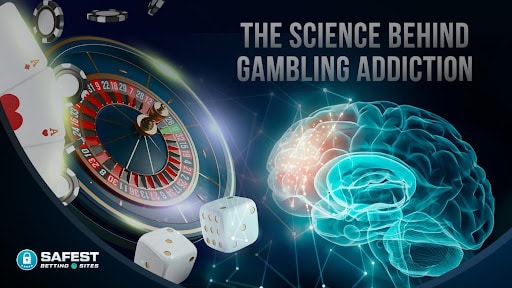Gambling addiction is now considered a behavioral disorder. The Diagnostic and Statistical Manual of Mental Disorders, 5th Edition (DSM-5) offers guidelines.
Impacting millions of Americans, there are many signs of problem gambling. They include lying to hide gambling habits and asking others to cover gambling debts.
What is the science behind gambling addiction?
Table of Contents
Psychology of Gambling Addiction
The personality traits of a gambler may differ from someone suffering from addiction. Research shows young adults get affected by compulsive gambling more than older adults.
College students engage in problem gambling online more than any other age group.
Gambling addiction stems from impairments to healthy brain functioning. Dopamine and serotonin are brain chemicals with specific roles. They make us feel good, regulate our moods, and help us to sleep.
Research shows that the act of gambling releases dopamine. Problem gamblers may experience dopamine desensitization, which is why they become addicted. They are chasing that “high” of feeling good.
Others might have genetic predispositions to behavioral disorders. Impulse control and rudimentary decision-making skills may get hindered when they gamble.
The Illinois Institute for Addiction Recovery breaks down gambling addiction into phases. They’re listed as follows:
- Winning
- Losing
- Desperation
- Hopelessness
To offset gambling issues, online casinos offer Responsible Gaming sections. Players may review helpful information to manage gambling habits. They can set daily, weekly, and monthly deposit, session, and wager limits.
There are also state and national hotlines available for gamblers. Player support systems offer help 24/7.
Many gambling addiction resources exist. They include treatment centers, recovery programs, therapy, and medication. State taxes on gambling support these initiatives.
Online gambling sites also track gambling habits among players. The gambling company might reach out or intervene if a player shows problems.
Responsible gaming tenets seek to prevent underage gambling. Self-exclusion options allow players to take breaks.
Every reputable gambling site offers problem gambling resources.
What are some external factors that might cause gambling addiction?
Causes of Gambling Addiction
We’ve mentioned some of the psychological factors associated with problem gambling. Other contributors may include socio-economics, mental health issues, or even gender.
The Mayo Clinic defines compulsive gambling. They claim it’s an “uncontrollable urge to keep gambling despite the toll it takes on your life.”
As research progresses, the causes of gambling addiction become more defined. Risk factors include:
- Age
- Influences of family or friends
- Personality traits
- Sex
- Mental health problems
These underlying hazards may cause relationship issues or job loss. In some cases, gambling addiction may even lead to legal trouble and imprisonment.
Gambling addiction impacts less than 3% of the U.S. population. Still, it’s important to recognize these dangers and get educated about them.
As a form of entertainment, healthy gambling habits are essential for having fun.
What Are Some Healthy Gambling Habits?
To prevent problem gambling, you should learn about discipline. The golden rule of gambling – never gamble with money you can’t afford to lose.
From that mindset, you may want to keep a gambling diary. Gambling sites document every wager that you make. Consider monitoring that to keep track of your wins and losses.
Avoid taking out loans or using credit cards. Don’t speculate with borrowed funds!
Set short-and-long-term realistic goals. Practice strict financial management and stick to a budget. Place wagers that represent 1%-5% of your bankroll.
For example, say you make a $250 deposit. You’d bet in increments between $2.50 and $12.50. Whether it’s sports betting or slots, that should help with protecting your bankroll.
Choose games that fit your betting style. For slots, we recommend you play fish table games online for real money. This is an excellent way of getting started with any bankroll, large or small.
Don’t forget to consider welcome deposits with match bonuses, too.
Problem Gambling Resources
Are you or is someone you know suffering from gambling addiction? Consider these resources:
- Gamblers Anonymous (gamblersanonymous.org)
- National Council on Problem Gambling (ncpgambling.org)
- Gambling Therapy (gamblingtherapy.org)
- Debtors Anonymous (debtorsanonymous.org)
- National Suicide Prevention Lifeline (988lifeline.org)
For further help, call 1-800-GAMBLER.
Conclusion
With the rapid growth of online gambling in the past few years, problems have arisen. Gambling addiction remains one of the biggest roadblocks to legalization around the world.
In that respect, gambling companies offer Responsible Gaming sections. They recommend that you keep track of your spending and avoid chasing losses.
Gambling is a form of entertainment. For most, it’s not a source of income.
Understand there is a science behind gambling addiction. If you’re predisposed to certain risk factors. Knowing when to walk away is as important as having fun.
Practice a few simple, healthy gambling habits for an enjoyable experience.





